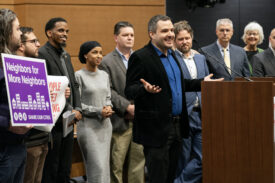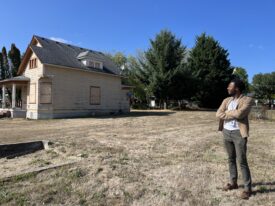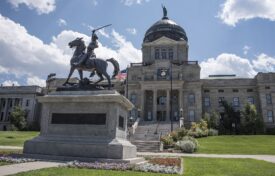A few weeks ago we released a little video about rethinking the transportation landscape. It looks like we’re not the only ones trying to picture things a little differently. Just this week, leaders in Oregon, California, and Washington all took steps to tinker with local transportation habits.
In Seattle, Mayor Greg Nickels took a cue from Portland and New York by instituting a few “car-free” Sundays where, throughout August, three city streets will be consecutively closed to cars. The program is part of Seattle’s “Give Your Car the Summer Off” project in which the city is encouraging citizens to drive 1,000 fewer miles this year:
“Neighbors will have three to six hours to experience our streets in a new way and to see how livable a city can be when people drive less,” Nickels said. “This is our chance to experiment and to evaluate how these events work for people. And we’ll be fighting global warming at the same time.”
Down in California, San Francisco is proposing a plan to require businesses to help their workers commute via transit or vanpools. The goal of the effort is to reduce emissions, part of the city’s “Transit First” program encouraging commuters to consider transit as their first option. The chief sponsor of the legislation, Ross Mirkarimi, noted, “It’s a modest action that could have a huge impact.”
And finally in Oregon, Governor Kulongoski is raising some big questions about transit and roads. He’s trying to get the city to think of transportation fixes in terms of least-cost solutions. The answer, he says, isn’t more roads, but it might be transit options and incorporating congestion pricing on city streets and highways:
“Under the old way of thinking, the solution to a traffic bottleneck would be: Build more lanes and invite more cars onto the highway,” Kulongoski said. “Under a least-cost model, we look for solutions that cost less and have a smaller negative impact on the environment.”
In addition, the city is looking to phase out tax credits on gas-electric hybrids in favor of new credits for all-electric cars or plug-in hybrids (with PGE opening new plug-in stations in Portland offering FREE charges for a limited time). Kulongoski not only sees these moves as a way to ease congestion, but to reduce pollution and save commuters (and the city) money as well.
We’ve written a littleabouttransportationissues in the past, so it’s great to see some local folks starting to paint (or at least setting up a new canvas for) a different picture of the transportation scene. Or, to borrow a term from Alan, to start working on a cure for that terrible case of “car-head” we have.







